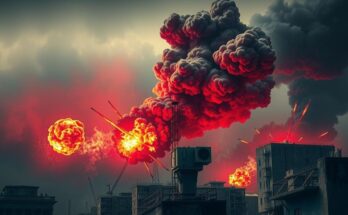Colombia’s President Gustavo Petro has enacted emergency powers to combat escalating violence in the Catatumbo region, granting himself authority to impose curfews and restrict civil rights. This response follows recent conflicts between the ELN and FARC dissidents, resulting in over 32,000 people displaced and numerous casualties. Human rights organizations are calling for urgent protections for the affected civilian population.
Colombia’s President Gustavo Petro has declared emergency powers to address escalating violence in the Catatumbo region, bordering Venezuela. This decree, issued on Friday, allows him to impose curfews and restrict civil liberties for up to 270 days, aiming to control the violent clashes between armed groups. Recent conflicts have led to over 32,000 people being displaced and at least 80 fatalities, according to human rights organizations. Citizens report indiscriminate attacks by armed factions in their communities.
The violence in Catatumbo has been fueled by competition for drug-trafficking routes between the National Liberation Army (ELN) and dissident factions of the Revolutionary Armed Forces of Colombia (FARC). Peace negotiations with the ELN were suspended by Petro’s administration due to this recent spike in violence, compromising his commitment to achieve “total peace” in Colombia. While efforts to reduce violence were initially successful, ongoing clashes have prompted additional military measures in the area.
In reaction to the surge in violence, the Colombian government has deployed thousands of soldiers to enforce security, while the attorney general has reiterated arrest warrants for ELN leaders. Despite the ELN denying accusations of harming civilians, armed insurgents seek control over territory and resources, perpetuating a cycle of violence that impacts the local population. The situation has compounded humanitarian challenges as thousands flee to seek refuge in neighboring regions.
Human rights advocates, including Amnesty International, have urged the government to protect civilians amidst these conflicts. Concerns regarding potential human rights violations, enforced disappearances, and killings have been voiced intensively. Similarly, United Nations Secretary-General Antonio Guterres has denounced the violence against civilians, advocating for humanitarian access and an immediate ceasefire to safeguard innocent lives.
The Catatumbo region has become a hotspot for violence as rival armed groups vie for dominance over lucrative drug trafficking routes. Since early 2023, tensions between the ELN and splinter factions of FARC have resulted in increased fatalities and mass displacements. The Colombian government, under President Petro, has sought to negotiate peace but has faced significant challenges due to resumed hostilities. The area has seen a marked increase in attacks on civilians and communal displacement, prompting urgent intervention measures and humanitarian responses.
In light of the recent violence in Catatumbo, President Petro’s declaration of a state of emergency underscores the dire security situation and the pressing need for effective governance. Despite efforts to bring peace, the reality remains complicated due to rivalries among armed groups and ongoing civil suffering. Ensuring civilian safety and urgent aid has become critical, as thousands are displaced, needing immediate assistance and protection in a rapidly deteriorating environment.
Original Source: www.aljazeera.com




